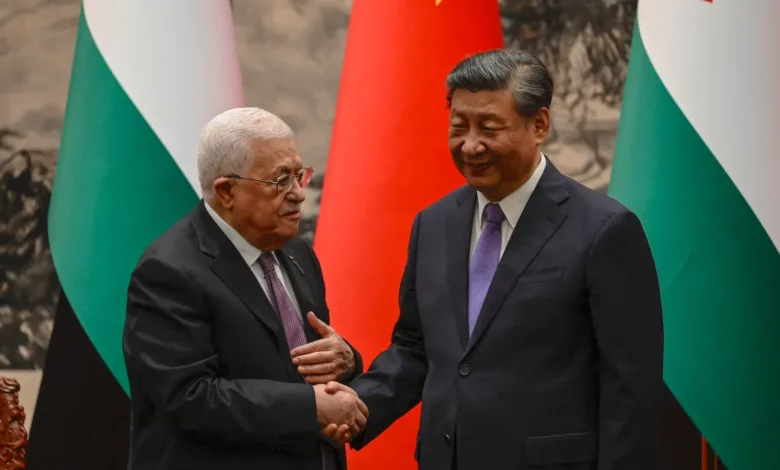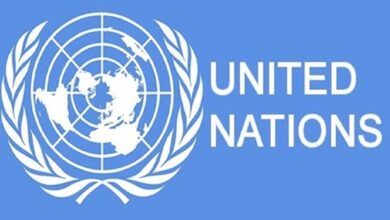
When Palestinian President Mahmoud Abbas visited Beijing in June, China vowed to contribute “Chinese wisdom, Chinese strength” to resolve the long-standing conflict between the Palestinians and Israel.
That pledge, coming on the heels of a Beijing-brokered rapprochement between bitter rivals Iran and Saudi Arabia, was widely seen as part of China’s ambition to expand its diplomatic clout in the Middle East – a region traditionally dominated by US power.
A few months on, Beijing’s offer to broker peace in one of the world’s most intractable conflicts is being tested by a fresh outbreak of war between Israel and Gaza, after the Palestinian militant group Hamas launched an unprecedented surprise attack on Israel.
So far, China’s response to the crisis – which has left at least 1,200 Israelis dead alongside 950 Palestinians and thousands more wounded or displaced – has been a bland call for restraint from both sides, with no condemnation of Hamas for a rampage that unleashed the killing of civilians and kidnapping of hostages, including children and the elderly.
Chinese leader Xi Jinping, who touted a Beijing-led security initiative for the Middle East as an alternative to the US-led system when he last visited the region in December, has yet to make any public statement on the conflict.
Experts say this initial response may expose Beijing’s limited influence in the region, despite official propaganda talking up China as the world’s new peacemaker.
“China doesn’t really have the experience or expertise in the region to make a meaningful change” on the long-running, complex Palestine-Israel conflict, said Jonathan Fulton, an Abu Dhabi-based senior non-resident fellow at the Atlantic Council.
“You don’t see governments in the region saying ‘what’s China’s solution to this’ because they’re not seen as a credible actor here yet.”
China’s response
As condemnations against Hamas poured in from the United States, Europe and much of Asia, Africa and Latin America, Beijing refrained from calling out the group and sought to present itself as a neutral party in the conflict.
In a brief statement Sunday, China’s Foreign Ministry called on “relevant parties to remain calm, exercise restraint and immediately end the hostilities.” It repeated Beijing’s support for a “two-state solution” to establish an independent State of Palestine as a way out of the conflict.
Beijing’s muted reaction to Saturday’s rampage by Hamas has drawn pushback from Israel. Yuval Waks, a senior official at the Israeli Embassy in Beijing, said his country expected a “stronger condemnation” of Hamas from China.
“When people are being murdered, slaughtered in the streets, this is not the time to call for a two-state solution,” Waks told reporters Sunday, according to Reuters.
US Senate Majority Leader Chuck Schumer, who was in Beijing for a bipartisan congressional visit, also expressed his disappointment with China’s response during a meeting with Xi on Monday.
“I say this with respect but I’m disappointed by the foreign ministry’s statement showing no sympathy or support for the Israeli people during these tragic times,” Schumer said, echoing criticism he had made earlier while meeting with China’s foreign minister.
Following the criticism, Chinese Foreign Ministry Spokesperson Mao Ning went a little further at a regular news briefing later on Monday, saying China was “deeply saddened by the civilian casualties” and condemns “any acts that harm civilians.”
But she sidestepped a question about whether Beijing considers Hamas’ attacks on civilians as terrorist acts and reiterated the message of neutrality, calling China “a friend to both Israel and Palestine.”
Throughout its statements, Beijing has stopped short of naming Hamas, describing the crisis vaguely as an “escalation of tensions and violence between Palestine and Israel.”
The closest reference to Hamas came from Zhang Jun, Beijing’s permanent representative to the United Nation, who said “intense clashes” had broken out between Israel and “armed groups in Gaza.”
Like Russia and most Arab countries, China views Hamas as a resistance organization, not a terrorist group as designated by the US and European Union.
China’s reluctance to name or condemn Hamas has drawn comparison to its response to the Ukraine war. There, Beijing has refused to condemn Russia’s aggression or even refer to it as an “invasion.”
And Beijing’s ambiguous stance on Hamas’ violence stands in stark contrast to its “zero-tolerance” approach to terrorism in the western region of Xinjiang, where authorities unleashed a years-long security crackdown that saw the mass internment of Uyghurs and other Muslim minorities.
State media coverage
Despite its claims of neutrality, coverage of the conflict on China’s state-run television appears more slanted.
Hamas fighters’ brutal killing of Israeli civilians was given little air time on the country’s most watched news program on state broadcaster CCTV. Instead, the prime-time show focused primarily on Israel’s airstrikes on Gaza – and the scenes of devastation they created there.
“You can plainly see China play sides,” said Phil Cunningham, a media consultant who tracks and analyzes CCTV’s nightly news program, noting it follows a similar pattern of the network’s pro-Russian coverage of the Ukraine war.
Chinese state media were also quick to blame the US for the conflict now raging in the heart of the Middle East.
In an editorial Monday, the Global Times, a nationalist tabloid affiliated with the Chinese Communist Party’s official mouthpiece, criticized Western countries – especially the US – for “taking sides” on the issue and “fanning the flames rather than cooling down the situation.”
“This is a consistent pattern for Western countries in many conflict regions, where they often create substantial obstacles to crisis resolution,” it said.
That evening, CCTV’s news segment on the conflict aired file footage of the USS Ford aircraft carrier, citing the US Defense Secretary as saying it had been deployed to the Eastern Mediterranean amid an increased presence of the US Air Force in the region. It then said a Hamas spokesperson had “condemned the US for its involvement in the invasion against the Palestinian people.”
On China’s heavily censored social media, many users have voiced support of the Palestinians and criticized Israel – often with a direct or veiled swipe at the US.
While some expressed shock and outrage over Hamas’ brutal killings of Israeli civilians, the deluge of anti-Israel posts is a telling sign of what kind of narrative is allowed to prevail in the country’s heavily curated online opinion.
Limited role
As the conflict escalates, Beijing finds itself in a tricky spot.
Fulton, the analyst at the Atlantic Council, said China’s response was consistent with its traditional lean toward the Palestinians on the issue with Israel.
When the Gaza conflict last flared up in 2021, Beijing – which held the presidency of the UN Security Council at the time – voiced support for the Palestinians and presented China as an alternative to the US on the issue.
China has long been friendly with Palestinian leaders.
Abbas, the president of the Palestinian Authority in the West Bank – which lost control of Gaza to its rival Hamas in 2007 – has visited Beijing five times in his nearly two decades in power. During his latest trip in June, Xi and Abbas announced an upgrade in bilateral relations to a “strategic partnership.”
But China has also deepened economic ties with Israel in recent years, ramping up trade and investment in sectors from technology to infrastructure. Israel has participated in Beijing’s Belt and Road initiative, which saw the construction of a new port in Haifa, the busiest shipping hub in the country, by a Chinese state-owned company.
However, the realization that Israel is always going to be in the US camp remains a major concern for Beijing, especially as its global rivalry with Washington heats up.
“China looks at Israel as an opportunity to get points with the broader Arab world and the rest of the developing world. If you criticize Israel, you get 20-odd Arab countries’ support in international fora. And that’s been very helpful in things like declarations on the situation in Xinjiang where a lot of Muslim-majority countries have voiced support for China’s approach,” Fulton said.
“I think in most issues, the Israel-Palestine conflict doesn’t really impact China directly. I think they use it as a tool for its own domestic and foreign policy objectives.”
Resolving the conflict will be a far cry from the peace deal China helped broker between Iran and Saudi Arabia, where both governments were looking for an exit ramp from bilateral tensions to focus on their own domestic challenges.
In that case, the heavy-lifting had already been done with the year-long effort by local actors Iraq and Oman – and China stepped in at the last minute to offer great power support, Fulton noted.
Following Abbas’s trip, Israeli Prime Minister Benjamin Netanyahu said in June he had also received an invitation for an official visit to China. But that trip is unlikely to take place now, Fulton said.
“The Israeli government is probably not in the same place as either the Saudis and the Iranians were for any kind of resolution. They’re probably going to want to ensure that Hamas can’t attack them like this again,” he said.
“I just don’t think there’s much chance for a country like China that doesn’t have deep experience in the conflict to play much of a role.”




